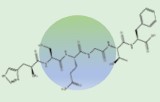Glucagon, a 29-amino acid peptide hormone, is a critical regulator of glucose homeostasis. Secreted by the alpha cells of the pancreas, glucagon prevents blood sugar from dropping too low by stimulating hepatic glucose production. This is achieved through multiple mechanisms that increase glycogenolysis and gluconeogenesis and decrease glycogenesis and glycolysis.
Key Functions and Mechanisms:
-
Stimulates Hepatic Glucose Production: Glucagon primarily acts on the liver to increase glucose output by promoting glycogenolysis (breakdown of glycogen) and gluconeogenesis (synthesis of glucose from non-carbohydrate sources).
-
Activates Intracellular Signaling Pathways: Glucagon binds to glucagon receptors in multiple tissues and activates G proteins, increasing cAMP levels and activating protein kinase A (PKA), leading to downstream effects on glucose metabolism.
Research Applications and Clinical Significance:
-
Diabetes Mellitus: Abnormal glucagon secretion is a key factor in pathological hyperglycemic states. The glucagon receptor has been pursued as a therapeutic target for treating type 2 diabetes.
-
Hypoglycemia: Glucagon administration is used clinically to treat hypoglycemia.
-
Glucose Homeostasis: Glucagon controls plasma glucose concentrations during fasting and exercise.


